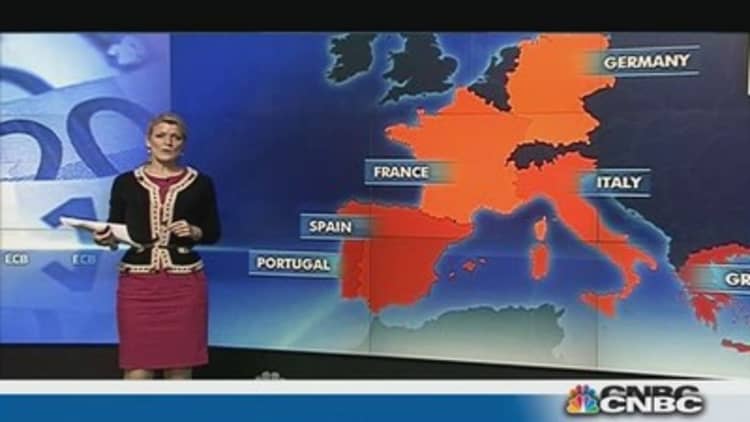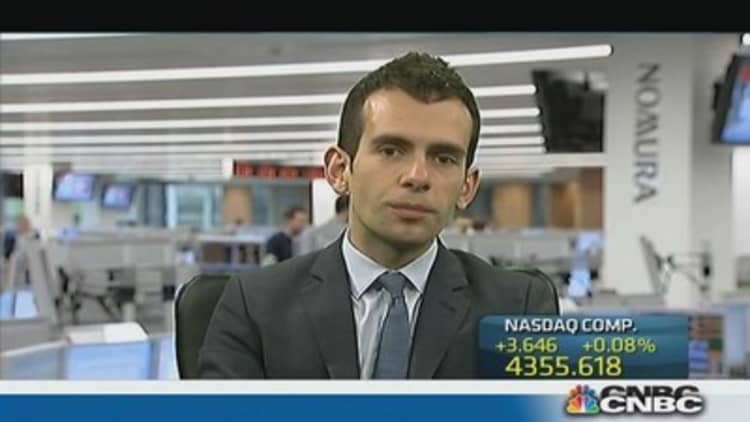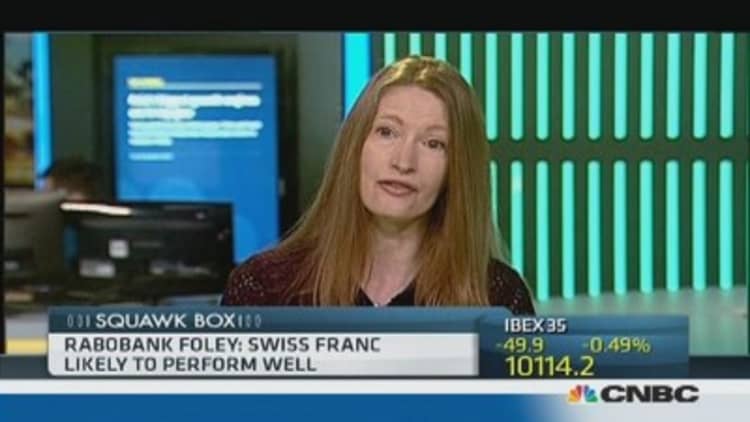
The International Monetary Fund (IMF) has warned of the risks of low inflation and called for the European Central Bank (ECB) to help strengthen the region's economy ahead its policy decision on Thursday.
The IMF blog, written by economists led by Reza Moghadam, director of the fund's European Department, says that Europe "can have too much of a good thing, including low inflation."
It comes despite better-than-expected euro zone inflation data, which came at 0.8 percent in February - welcome news for the ECB, as previous figures had fueled concerns about growth-sapping deflation.
"The ECB must be sure that policies are equal to the tasks of reversing the downward drift in inflation and forestalling the risk of a slide into deflation," Moghadam wrote.
"It should thus consider further cuts in the policy rate and, more importantly, look for ways to substantially increase its balance sheet, be it through targeted LTROs (long-term refinancing operations) or quantitative easing (public and private asset purchases)."
As markets prepare for Thursday's decision - and economists remain split on whether the central bank will act or not - here's a look at the options open to the central bank:
Cut rates
The ECB last cut rates in November, from 0.5 percent to a new record low of 0.25 percent. That move was not expected by markets or the majority of economists, and has led to some heightened expectations of another surprise cut by the ECB.
(Read more: German courtdecision 'real threat' to ECB's safety net)
Frederik Ducrozet, senior euro zone economist at Crédit Agricole, forecast a small, pre-emptive, cut in the ECB's main interest rate this week.
"There remains a tactical case for pre-emptive easing, in our view," he wrote in a note. "Signalling remains important, and we believe that the ECB will have to give the market 'something' to avoid too large a disappointment that could lead to tighter monetary conditions."
Remarks from Christine Lagarde, managing director of the IMF, had already boosted the rate-cut camp. Lagarde on Monday said the euro zone risks an extended period of low inflation and urged central bankers to be ready to "guard against it."

Another LTRO
IHS Global Insight's Chief European Economist Howard Archer said the ECB will add liquidity to the system, after data released last week revealed that lending in the euro zone to the private sector is still falling.
One fund-boosting option would be to launch more "long-term refinancing operations" (LTROs). These ultra-cheap, long-term loans are offered by the central bank to the region's lenders in an attempt to boost lending to businesses and consumers.
Societe Generale's European Economist Anatoli Annenkov said that although he expects the ECB to leave policy unchanged in March, the bank will stand ready to provide another LTRO later this spring.
(Read more: Euro soarsas Draghi plays down deflation talk)
"As liquidity is gradually being withdrawn ahead of the redemptions of the three-year LTROs in early 2015, we see the need for the ECB to provide a liquidity back-stop for banks still struggling to find long-term financing," he said in a note.
End 'sterilization'
The ECB could also add liquidity by ending its efforts to offset its government bond purchases.
Currently, the ECB "sterilizes" the money it spent buying sovereign bonds during the euro zone's debt crisis under the Securities Markets Program (SMP) - a move designed to avoid inflation or currency appreciation.
"Halting the sterilization of the SMP could also be an alternative, adding some 175 billion euros ($240 billion) of liquidity, in addition to prolonging the full allotment provisioning in its main refinancing operations," Annenkov said.
Meanwhile, Crédit Agricole's Ducrozet said the ECB could stop the sterilization at its March meeting "while pondering its other options in the next few months."

Quantitative easing
Unlike central banks in the U.K., U.S. and elsewhere, the ECB has not launched an asset purchase, or quantitative easing (QE), program – mainly because there are no common euro zone bonds and the process of picking which country to buy is fraught with political dangers. Nonetheless, analysts are divided over whether the ECB will ever make such a dramatic step.
IHS's Archer, for instance, said QE would prove "too controversial a policy" within the ECB's Governing Council to get adopted. But BNP Paribas economists, led by Ken Wattret, expect the ECB to announce an asset purchase program from this summer onwards to "meet its primary objective of maintaining price stability."
The economists forecast the ECB will announce an initial program in the range of 300-500 billion euros – although they stress that predicting the size of the program is "more of an art than a science."
Do nothing…
Perhaps the most likely outcome of March's meeting, however, is that the ECB holds fire.
(Read more: This isthe ECB's biggest task for 2014: SocGen)
"Given the latest economic data… it is hard to see how the ECB could decide on new action this week without jeopardizing the credibility of its proudly presented reaction function," ING Senior Economist Carsten Brzeski wrote in a note.
Bank of America Merrill Lynch analysts led by Laurence Boone agreed that the ECB would not fire a "bazooka" at its March meeting, despite very low inflation and rising deflation risks.
"Looking ahead, we believe that the ECB is not worried about deflationary risks yet. However, the ECB might be pushed into action at the April meeting, or this summer, if inflation falls further," he said.
—By CNBC's Katrina Bishop.Follow her on Twitter @KatrinaBishopand Google


